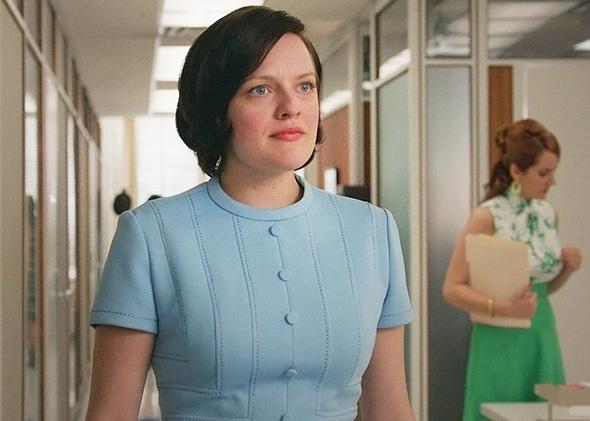Seth, Julia,
I am starting to write a little bit late because like everyone else in the media (and probably no one else other than graduating seniors) I was watching Jill Abramson’s commencement speech at Wake Forest. The firing of Abramson last week has been, among other things, an occasion for gossip, speculation, and schadenfreude, plus an object lesson-in-absentia that PR professionals do actually do something. But it has primarily, rightly or wrongly, become a referendum on gender politics and whether it is possible to be a boss while female without always being held to the impossible, unwritten standards of being a female boss.
Needless to say, this exact issue informed Peggy’s storyline last night, in such a random, synchronous way that when Pete crowed, allegedly complimentarily, “You know she’s every bit as good as any woman in this business,” I actually said out loud, “Oh God, it’s like they are going to make us talk about the New York Times.” Abramson’s firing is real and Peggy’s story is fiction, but both illustrate just how difficult it is to separate a person—with all the strengths and weaknesses, foibles and quirks that make her a specific, individual human being—from how her gender alters our experience and expectations of that person.
On the one hand, Peggy is Peggy because, simply, she is Peggy. Peggy reacts to every situation she encounters, whether it’s a delivery of flowers or being tasked with being her old boss’s boss, exactly as Peggy ever could and would. But how Peggy reacts also has to do with her experiences as a woman, and how we see Peggy has to do with the fact of her being a woman. Peggy and her gender are not one and the same, and yet they are also completely, frustratingly inextricable.
Which is a long way of saying: Peggy displays a degree of uncertainty in this episode that seems specifically Peggy but also seems specifically female. Peggy lacks Don’s confidence: This is both because she is a woman who is undermined at almost every turn by her colleagues but also because she is Peggy, a person specifically sensitive to the critique of her mentor. It is worth remembering that Peggy has very capably mimicked the “unladylike” behavior of Don when it comes to, for example, verbally abusing her underlings and then napping. And yet she cannot feign his supreme confidence. And even as I write that I wonder: Would Peggy’s uncertainty about the Burger Chef ad read as uncertainty were she a man? Would Man-Peggy maybe seem curious, open, willing to keep exploring new options? Or would he just be less tortured by his uncertainty to begin with? Would he, like Don, do a better job camouflaging his panic?
Certainly, the gender politics of her office put Peggy into serious contortions even before she had a crisis of faith about the—seemingly very good—Burger Chef ad. There is maybe a red flag waving above the campaign because Lou likes it, and a crimson flag because it fulfills his observation about “Who gives mom permission? Dad!” But the real crisis is precipitated by Pete taking the pitch from Peggy, in the guise of giving her a “choice.” By the time she goes to Don and tells him she wants him to give the presentation, the dynamic is beyond tortured. Don, essentially, responds as we wish Pete and Lou had: You were great! You should pitch! Who is telling you to do this?? But because Peggy is so intent on preserving the image of her power in front of Don, she reacts brusquely, cannot take succor in his compliments, and brushes him off. Is it any wonder that Don’s remark that he thought about doing the ad from the kid’s point of view sends her into an abyss of self-doubt?
While I found Peggy and Don’s ultimate rapprochement very touching, please note that Pete only signs on to Peggy’s new idea at Don’s prompting. Pete still needs Dad’s permission. And so does Peggy. Don, basically, incepts Peggy, planting a notion in her head—there is a better idea out there—that she cannot shake until he sits with her and they talk it through to that better idea. I’m not sure she could have done it without him—not in terms of the content of the notion, but the certainty that it was right. Peggy still needs Don’s approval too.
Immune to incepting: Don and Joan, a duo with much in common who have not had much occasion to play off of each other this season. Joan had to deal with the episode’s other most condescending line said by a man who is trying to be nice —“I am offering you more than anyone else ever will,” Bob says—but she, unlike Peggy, knew exactly what to do with that offer. I thought one of the more comic and light-handed touches of this storyline was that, despite the seriousness of the proposal, Joan takes it as lightly as she should: She immediately gets focused on how SC&P is losing the Chevy account. Maybe Don would find that, like all working mothers, “too sad.” I thought it was charming.
I’ve left you Pete, Julia, because I can’t stand him,
Willa
